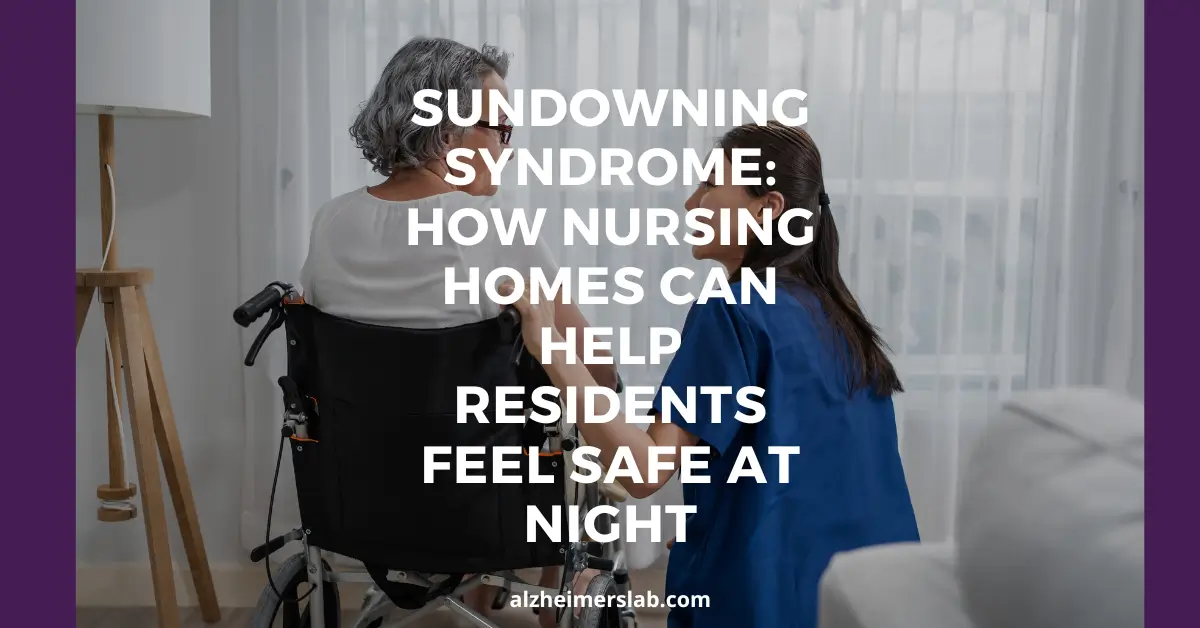Sundowning Syndrome: How Nursing Homes Can Help Residents Feel Safe at Night
If you have a loved one with dementia, you might have noticed that their behavior changes in the evening. They may become more confused, restless, or even agitated as the sun goes down. This is called sundowning syndrome, and it is common in people with Alzheimer’s and other types of dementia. It can be stressful for both the patient and the caregiver, especially in a nursing home setting where many residents may experience the same problem at the same time.
Sundowning syndrome makes people with dementia feel more confused and anxious in the evening. Nursing homes can help by using soft lighting, keeping a routine, and offering calm activities before bedtime. Caregivers also need to watch for triggers like hunger or discomfort to make sure residents feel safe at night.
Why Does Sundowning Happen?
Sundowning doesn’t have a single cause, but experts believe it is related to changes in the brain due to dementia. Some possible reasons include:
- The body’s internal clock not working properly, causing confusion about day and night.
- Fatigue from the day making it harder for the brain to function.
- Shadows and dim lighting making the environment feel unfamiliar or scary.
- Hunger, thirst, or discomfort being harder to express.
- Medication side effects.
- Overstimulation from the day’s activities leading to stress.
How Can Nursing Homes Help?
Keeping a Consistent Routine
People with dementia feel safer when they know what to expect. Nursing homes can create a structured daily schedule that includes:
- Regular meal times.
- Set times for waking up and going to bed.
- Relaxing activities in the evening to help residents wind down.
- Gentle reminders about what is coming next to reduce confusion.
Creating a Comfortable Sleeping Environment
A calm, quiet, and familiar sleeping space can prevent restlessness. Nursing homes can make small changes like:
- Using warm, dim lighting instead of bright lights at night.
- Keeping rooms at a comfortable temperature.
- Reducing noise from staff conversations or TVs in common areas.
- Providing weighted blankets or soft music for comfort.
Managing Triggers
Certain things can make sundowning worse. Caregivers should watch for and manage triggers such as:
- Hunger: Offer a light snack before bedtime.
- Pain or Discomfort: Ensure residents have used the restroom and are not in pain.
- Medications: Review medications that could be affecting sleep.
- Overstimulation: Keep the evening calm with soothing activities like reading or soft music.
Encouraging Daytime Activity
Residents who are active during the day sleep better at night. Nursing homes can help by:
- Offering light exercise like walking or stretching.
- Providing activities that engage the mind, like puzzles or storytelling.
- Making sure residents get some sunlight during the day to regulate their body clock.
Training Caregivers to Handle Sundowning
Staff in nursing homes should be trained to handle sundowning episodes calmly. They should:
- Speak in a soft, reassuring tone.
- Avoid arguing or correcting the resident’s confusion.
- Redirect attention to something soothing, like looking at photos or listening to music.
- Know when to call for medical help if needed.
What Does the Research Say?
Studies on sundowning have helped experts understand why it happens and how to manage it better. Research shows that:
- Up to 66% of people with dementia experience sundowning. It is more common in later stages of the disease.
- Light therapy helps reduce symptoms. Exposure to bright light in the morning can improve sleep patterns and reduce confusion at night.
- Melatonin supplements may help. Some studies suggest melatonin can improve sleep quality, but it should be used under medical supervision.
- Structured routines lower anxiety. Research confirms that keeping a daily routine helps dementia patients feel more secure and reduces evening agitation.
- Physical activity improves sleep. A study found that dementia patients who engaged in light exercise during the day had fewer sundowning episodes.
These findings suggest that nursing homes should focus on light exposure, routine, and physical activity to help residents feel safer at night.
Common Questions About Sundowning in Nursing Homes
Is Sundowning a Sign That Dementia Is Getting Worse?
Not necessarily. While sundowning can be frustrating, it does not always mean that dementia is progressing faster. However, if it gets worse over time, the care plan may need to be adjusted.
Do All People with Dementia Experience Sundowning?
No, not everyone with dementia will have sundowning. It is more common in the later stages of the disease, but some people never experience it.
Can Medication Help?
Sometimes, but it should not be the first option. Medications like melatonin or anti-anxiety drugs may be used in severe cases, but lifestyle changes should be tried first.
How Can Families Help?
If you have a loved one in a nursing home, you can support them by:
- Visiting at calm times of the day to avoid overstimulation.
- Bringing familiar items like a favorite blanket or pillow to make their room feel like home.
- Communicating with staff about what comforts your loved one.
Key Points to Remember
- Sundowning causes confusion and restlessness in people with dementia, mainly in the evening.
- Nursing homes can help by keeping a routine and creating a calm environment.
- Caregivers should watch for triggers like hunger, pain, or overstimulation.
- Regular daytime activity and exposure to sunlight can improve sleep at night.
- Families can support their loved ones by working with nursing home staff and providing familiar items for comfort.
Thanks for reading. I hope this article helped. If you have any questions, comment below!

